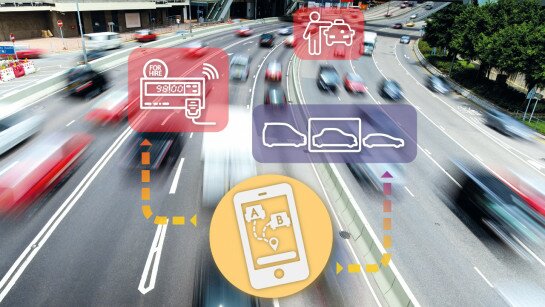EXECUTIVE SUMMARY
Introduction
One of the major disruptive forces to economies around the world has been the acceleration in scope, scale, and economic impact of information technologies using the Internet. New business models have emerged finding new ways of providing services to consumers that are overturning the status quo of existing trade practices in different market places through utilising new technologies.
The Hong Kong taxi industry is one of many facing this challenge. E-hailing services are a global phenomenon where service providers make use of communications technology to provide more personalised and efficient services to those consumers who are seeking personalised point-to-point car transport. This is usually marketed as a "ride-sharing business" in the context of a sharing economy.
The E-hailing service providers typically call themselves transportation "network" companies because their services are based on the network they create as “matchmakers” that brings passengers and drivers together. However, the rapid growth of these network companies has raised concerns due to the market disruption caused to incumbent taxi operators, and the implications on the long standing regulatory regimes that have been introduced to address legitimate concerns on passenger safety and welfare.
The Way Forward for Hong Kong
The Council welcomes the Government's desire to create a system of franchised taxis in response to consumers' desires for better quality service and a greater range in vehicle types. However, the mechanism currently proposed by the Government would not appear to fully satisfy the call for improvement from consumers and is not well suited to matching the existing E-hailing services that are popular in many countries. It would be regretful if the reforms currently being contemplated also missed the chance to introduce more competition and to embrace new offerings from the emergence of E-hailing services.
Like many markets, one of the key issues to be considered is how to minimise disruption to existing taxi drivers from the introduction of E-hailing. The Council recommends that the Government considers the Council’s proposal for reform, as suggested in this study, if the Government’s proposed “Franchised Taxi Services” fails to deliver its promise.
Leveraging of information and communications technology (ICT) to enhance passenger experience will continue to drive change in the marketplace, regardless of the wishes of the incumbent industry operators or the Government. The worst case scenario for consumers will be that the benefit that arises from the use of the latest technology will not reach its full potential in driving the improvement of the taxi industry, and lead to economic loss.
The Council therefore recommends that the Government takes the initiative and adopts a “progressive” and “transitional” approach to minimise disruption to existing taxi drivers from the inevitable changes that will arise due to technological developments and the impact of Big Data, as characterised by E-hailing services. This approach can begin with the application of licences/permits to E-hailing service providers; and the introduction of quotas for newly licensed operators; to control the momentum in migrating towards a more open market based system.
Specific Council Recommendations
The Council believes that the introduction of a parallel regime consisting of both taxi and E-hailing services with resultant benefits of increasing competition, will in turn strengthen the service quality of market players. To reduce barriers of entry and to foster innovation, it would be desirable to impose fewer requirements for E-hailing services as far as possible. Ideally, the Government should focus more on those regulatory requirements that are key areas of concerns to passenger safety and operating effectiveness so that the Government is able to impose proper enforcement and traffic control.
The Council suggests that the process could make use of the existing 1,500 hire car permits (HCPs) issued by the Commissioner for Transport by relaxing, to some extent, the stringent requirements which govern that business environment, and which can embrace the features of E-hailing services. To begin with, the new system would grant three distinct permits:
- Franchisees of E-hailing services – applying conditions on E-hailing platform service providers;
- Time-limited car permits – applying conditions to vehicles used for E-hailing services (no need for the Government to issue car permits if delegated to the E-hailing service operator); and
- Partner driver (PD) or hire car permits – applying conditions to the “partner drivers” (no need for the Government to issue driver permits if delegated to the E-hailing service operator).
The Council also recommends that a staged approach be implemented through transitional phases whereby:
- E-hailing platforms, vehicles and drivers all need licences, with a quota applied to the numbers of vehicles and new market entrants;
- Regulatory conditions are imposed on vehicles and drivers to safeguard passengers;
- Specific licensing requirements of E-hailing service providers are introduced to maintain price transparency, adequate customer personal safeguards and traffic control; and
- Market segregation between taxi and E-hailing services.
It is important that data be collected to ascertain how extensively E-hailing services are utilised; the impact on road congestion; and the extent, if any, of deleterious impacts on existing taxi drivers.
Within a reasonable period of time, the regulatory framework should be shifted to one that is more amenable to an open market. What the Council envisages is an evolutionary process that concerns the interest of the public with gradual transitions from the existing public transport taxi service model that is primarily based on the taxi industry (including the new franchised taxi service) to one that incorporates market driven E-hailing, and adjustments to the hire car segment thus builds in competition in the personalised point-to-point car transport service market.











